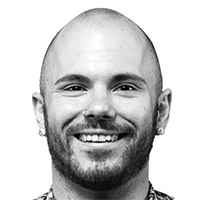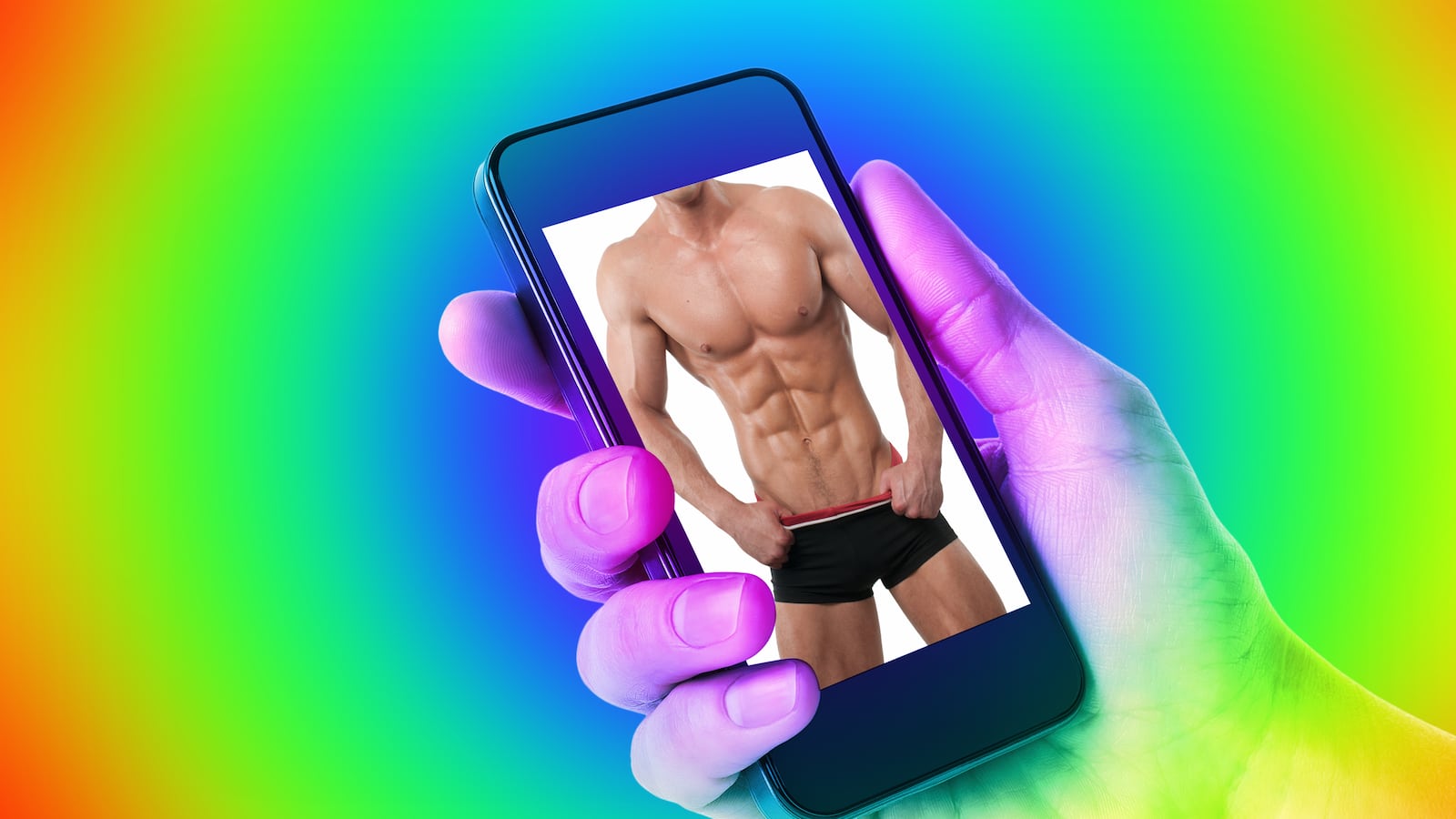Have you ever been told you’re too fat for Grindr? A recent study from the Psychology of Sexual Orientation and Gender Diversity shows you’re not alone.
According to researchers Olivia Foster-Gimbel and Renee Engeln, one-third of the gay men they surveyed reported experiencing “anti-fat bias”—even among those who weren’t classified as overweight by the Body Mass Index. These forms of everyday discrimination most commonly included “rejection by potential romantic partners on the basis of weight.”
For instance, were a “fat” gay man to approach someone in a bar, Foster-Gimbel and Engeln found that there was a “greater likelihood that the overweight man would be blatantly ignored, treated rudely, or mocked behind his back” than a heterosexual male of the same size.
In the ’90s sitcom Will and Grace, there’s an old joke that men could be considered skinny by straight standards but labeled fat among their gay peers. Because it’s hard to speak with accuracy about the habits and preferences of an entire community, this is a generalization, but it’s one that is often true. Gay men face enormous pressure to fit into a very narrow view of beauty—often defined on hookup apps like Grindr and Scruff by the groups they leave out: “No Fats, No Femmes.”
These politics of exclusion leave many feeling left out of a community that, after coming out, they hoped would embrace them. In a BuzzFeed article from 2013, Louis Peitzman argued while the LGBT community might preach to its youth that “It Gets Better,” the message for plus-size queers isn’t so hopeful.
“I can tell you that when I lost 15 pounds due to depression, a well-meaning older gay man told me I had done the right thing,” he writes. “I can tell you that one person I tried to date helpfully offered, ‘You could be really attractive if you lost some weight.’”
While Peitzman says that the majority of these incidents amounted to concern trolling—hurtful comments disguised as life advice—others lacked even the veneer of friendliness. In an extreme example, Bruce, a 35-year-old man living in Chicago, was called a “fat pig” by another member of his gym. Bruce asked the gentleman out on a date, and after exchanging contact information, he received this message in his inbox:
I didn’t have the guts to tell you this at the gym but I won’t be going with you to see the Cubs. It’s not because I have a boyfriend or anything like that. It’s because I have a hard time respecting you.
There’s really no kind way to say this so I’ll just come right out with it. You’re a fat pig. I’m not trying to judge you or anything, really. It’s just that I take care of my body and spend a lot of time focusing on my health. Just looking at you, I can tell you don’t. Yeah, you show up to workout but I’ve watched you and most of the time, all you do is cruise other guys.
The worst part is that the men you seem to check out are way out of your league. Why would anybody be interested in you when you obviously don’t give a crap about yourself? Instead of trying to drum up conversations with me and other guys, you should spend more time losing the fat.
As Pace University professor Dr. Jason Whitesel writes in his 2014 book, Fat Gay Men: Girth, Mirth, and the Politics of Stigma, queer men even have trouble finding community in gay subcultures that should act as informal support groups (e.g., bears or otters). Whitesel interviewed the members of Girth & Mirth, an international organization dedicated to celebrating “big men and their admirers,” and found that they had internalized a great deal of the bias that they’d experienced from outside the community.
Whitesel writes, “Some big men confessed that they want to dissociate themselves from other people who are fat, as if fatness were contagious.” This included a respondent who explained that his fat positivity had limits: He “drew the line at ‘super-chubs,’” despite the fact that he himself weighed 300 pounds. This phenomenon proved such an issue for Girth & Mirth that expanding membership has been difficult.
One member describes inviting attendees at a pride parade to march with the group. “[P]eople were offended,” he said. “Some people were just shocked we had identified them as one of us, and they didn’t want to be.”
***
If this fat shame is so pervasive, where does it come from?
According to blogger Virgie Tovar, it’s both a product of the larger cultural hang-ups around body image and masculinity itself. “Fatphobia in so many ways is about hating and policing women and our bodies, but what I’ve realized recently is that in some ways, the fatphobia that fat men experience is also a result of misogyny,” she writes.
To be overweight is, thus, to be considered simultaneously weak and feminine, so much so that the Grindr commandment against “fats and femmes” is almost always a package deal.
It’s not hard to find evidence of an explicit linkage between these two ideas. Back in 2012, Natasha Turner of The Dr. Oz Show—not exactly known for its scientific rigor—reported that “abdominal fat in men increases the conversion of testosterone into estrogen.” Turner continues, “As estrogen levels rise, so does the tendency to accumulate more abdominal fat, fueling the situation.”
For an even less scholarly view on the subject, check out this post on a Paleo forum:
I’ve come to view excess body fat as a kind of female secondary sex characteristic these days that certainly doesn’t do much to enhance the manliness of those males in possession of it. I encounter a lot of overweight or obese males who seem to view their girth as being mostly muscle, but it’s solely the result of sweets, sweetened beverages, breads, and other foods that seem to be more in what I at least associate with the female realm. You can’t really get fat from gnawing on carcasses and other manly eating practices.
These ideas are particularly harmful for gay men, many of whom might have grown up internalizing negative messages about queer people from a young age. Homophobia itself is rooted in misogyny: It’s bad to be gay, because having sex with men is something that a woman does.
As Simon Moritz explains in the Huffington Post, slurs like “fairy” and “sissy” have a dual meaning rooted in anti-gay and anti-woman bias: “They prize masculinity by demonizing femininity.”
While many gay men might grow up to question that gender essentialism and embrace living in the gray areas of gender expression (after all, a little eye shadow never hurt anyone), others might feel even more invested in traditional definitions of manhood. Who can blame them? Many queer youths spent their entire childhoods being bullied and shunned by their peer groups, and as adults, they crave what we all desire: a sense of belonging. They just want to finally fit in—any way they can.
If Gawker’s Brian Moylan suggests that need for acceptance breeds a culture of “fear”—where we’re worried we won’t be fit or attractive enough to get invited to the right party or the right bedroom—it’s also creates even more ostracizing. “This cycle of insecurity sets a nearly impossible beauty standard and sends a toxic message to queer men: If you don’t look a certain way, you don’t deserve to be loved,” Tovar argues.
The gay community’s toxic masculinity problem isn’t just an issue for those who are told they “need to lose a few pounds,” but everyone who is told that they don’t fit an unrealistic standard of physical perfection—including those who are too skinny, too short, or not white. After all, you can’t throw a rock on Grindr without hitting someone who doesn’t want to hook up with black guys or Asian men.
That beauty myth has proven incredibly harmful: If queer men shell out more money than any other population on getting fit, they also have the highest rate of eating disorders. Statistics from the National Eating Disorders Association (NEDA) show that while gays account for roughly 5 percent of the population, they represent 42 percent of men with a history of disordered eating.
As NEDA found, telling those men that being skinny and fit is the sole answer to their problems won’t help anyone. Instead, a truly affirming community is one that promotes acceptance. “A sense of connectedness to the gay community was related to fewer current eating disorders, which suggests that feeling connected to the gay community may have a protective effect against eating disorders,” the organization writes.
For decades, feminists have been telling us exactly that. The solution to our image issues isn’t to create more stigma but to further a space for inclusion—that shows the beauty of a diverse range of body types and gender expressions. Rather than fostering a culture where everyone has to look the same to be beautiful, it’s about celebrating difference.
Gay men desperately need to champion our own body positivity movement, one that looks beyond tanned go-go boys and muscle beach bros. Sure, you can have a good body and an enlightened view of masculinity, and lots of people go to the gym for their own reasons.
There’s nothing wrong with being buff, but a great shirtless selfie shouldn’t be a prerequisite for feeling like you’re man enough to belong.






